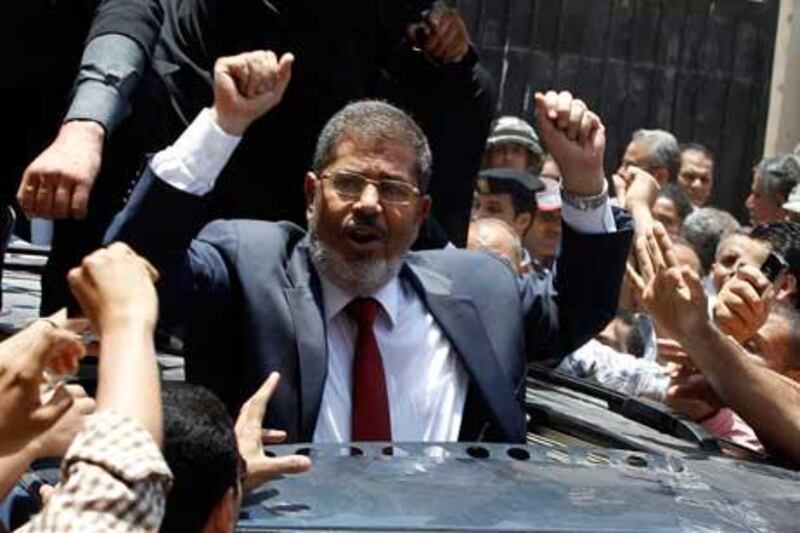CAIRO // The Muslim Brotherhood declared this morning that its candidate, Mohammed Morsi, had won the presidential run-off elections.
Final vote tallying could take several more days, but the claim appeared to be supported by preliminary tabulations from local newspapers based on results announced at individual polling stations across the country. The group said Mr Morsi, 60, had won 51.8 per cent of the vote. The final result is expected to be announced on Thursday.
"Thank God, who guided the people of Egypt to this right path, the path of freedom and democracy," Mr Morsi told a press conference in a victory speech. He promised to "be a president for all Egyptians ... a servant to them" and seek a "civil, democratic, constitutional and modern state".
Today the camp of his election rival Ahmed Shafiq, Hosni Mubarak's last prime minister, disputed the result.
"We reject it completely," Shafiq campaign offical Mahmud Barakeh told reporters of the Brotherhood's proclaimed victory."
"We are astonished by this bizarre behaviour which amounts to a hijacking of the election results," he added, saying Shafiq's campaign had figures showing him leading the vote.
The success of Mr Morsi's campaign in marshaling voters was proof of the powerful electoral machine of the Muslim Brotherhood, which has consistently surprised skeptics with success at the ballot box. It also could mark a historic momentfor the Islamist group, which spent more than eight decades operating in the shadows because of repression from Egypt's strong-armed rulers who viewed them as one of their greatest threats.
Mr Morsi would assume power at one of the tensest moments in the country's transition to a new democracy sixteen months after Hosni Mubarak was forced to resign amid a popular uprising that saw hundreds of thousands protest in the streets.
The Supreme Constitional Court ordered parliament dissolved last Thursday because a third of the elections for the lower house were unconstitutional. That move erased much of the democratic progress Egypt made since Mubarak's abdication.
The decision hit the Muslim Brotherhood's Freedom and Justice Party the worst because the group had won nearly half of the seats in parliament.
The elections on Saturday and Sunday were meant to be the final round of voting before the Supreme Council of the Armed Forces (Scaf), a group of generals who have been in control of Egypt since Mubarak resigned, handed power to a new civilian government.
After the SCC decision, however, the Scaf assumed legislative powers until a new People's Assembly is elected. A new constitutional declaration issued by the Scaf last night laid out a new transition plan for Egypt, where it would appoint a commission to write a new constitution before parliamentary elections.
The declaration augured a looming power struggle between The Muslim Brotherhood and the military. Though he will become the head of the executive branch, the Scaf holds sweeping powers and could block his initiatives. The document published last night said the president would have no control over the military or its budget. The president will be able to appoint the cabinet and approve or reject laws.
The campaign of Ahmed Shafiq, who was seen by many as the candidate who would be a continuation of the old regime, alleged widespread electoral misconduct by the Muslim Brotherhood late last night. However, election monitors have said there were only minor irregularities, and that voting was largely free and fair.
Ahmad Sarhan, Mr Shafiq's campaign chief, said Mr Morsi's supporters offered money and food to "bribe" voters, intimidated Mr Shafiq's supporters, prevent access to voting stations and defacing election posters.
"The Muslim Brotherhood's systematic election violations prove how they do not believe in freedom of choice and democracy unless it brings them to power," he said on his official Twitter account last night. "The organised and persistent election fraud by [the Muslim Brotherhood] proves they can, will and only talk the talk and never walk the walk of liberal democracy."
The Muslim Brotherhood and its political arm, the Freedom and Justice Party, denied the claims.
Mr Morsi portrayed himself during the run-up to the elections as the revolutionary choice in the race. His has promised a "renaissance" project for Egypt that would improve the economy with an emphasis on grass-roots projects that would distribute wealth more equally. And he has said he would push Egypt closer to an Islamic state, where laws were in accordance with Shariah principles.
Many of Mr Shafiq's supporters - including Coptic Christians - have said they feared that Egypt would become more repressive under a government controlled by members of the Muslim Brotherhood, but representatives of the group have said they would not impose religion on Egyptians and would protect minority rights. During Mr Morsi's victory speech this morning, he mentioned churches and Christians several times.
Observers in Egypt predicted more confrontations in the days ahead. On Tuesday, an administrative court is set to issue a decision about whether the Muslim Brotherhood itself is a legal group. On the same day, members of the dissolved parliament are planning a march against the SCC's decision.
Omar Ashour, a professor of Arab and Islamic Studies at the University of Exeter who was monitoring elections in Egypt, said that all signs in the last week pointed to an "undeclared coup".
"There is some gearing up for a confrontation among all stakeholders," he said.
bhope@thenational.ae
Additional reporting by the Associated Press and Agence France-Presse





